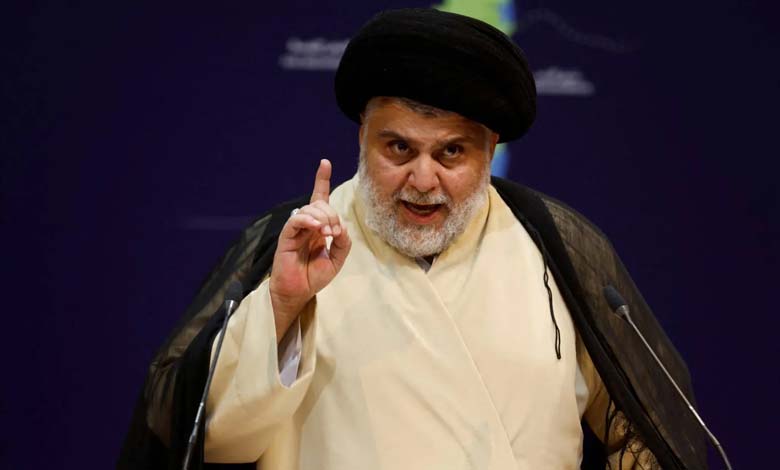Al-Sadr Disowns Candidates Defying Election Boycott Decision

Although the Sadrist movement is officially absent from the political process, it remains a major social force, raising concerns that its popularity could be exploited by rival groups.
The leader of the Sadrist movement, Muqtada al-Sadr, reaffirmed his firm stance against rejoining the electoral race, while warning against attempts to use his name and the movement’s widespread popularity for partisan or personal interests. His warning directly targeted figures affiliated with the movement who are running in the upcoming elections without his blessing.
-
Political Corruption Decides al-Sadr’s Decision to Boycott Elections
-
Al-Sadr Calls on Government to Punish Those Intervening in Syria
In a statement issued Thursday, al-Sadr formally disowned 15 parliamentary candidates linked to the Sadrist movement and its armed wing, Saraya al-Salam. Personally signed by al-Sadr, the statement included the explicit phrase: “I disown them all,” underscoring his categorical rejection of what he viewed as a circumvention of his earlier decision to boycott elections.
While urging his followers not to vote for these candidates, al-Sadr also stressed the need to avoid insulting or attacking them, making clear that his objection is political rather than personal, and rooted in a reformist principle he has upheld since withdrawing from politics in 2022.
-
Al-Sadr Prevents Random Displays of Peace Brigades, Fearful of Infiltration
-
The mystery surrounding Muqtada al-Sadr’s position on the Iraqi local elections is prompting Nouri al-Maliki to test him
Al-Sadr’s withdrawal from the political scene was not sudden. It followed a complex sequence of events after the October 2021 snap parliamentary elections, in which the Sadrist bloc won the largest share of seats (73). However, his coalition with other political forces failed to form a government due to the so-called “blocking third” mechanism, activated by the Shiite Coordination Framework under a constitutional interpretation regarding the presidential election.
After months of deadlock, al-Sadr ordered his bloc’s MPs to resign from parliament, a move that reshaped the political landscape. Since then, he has repeatedly insisted that there will be no return to politics as long as “corruption remains entrenched and weapons stay outside state control.”
-
Al-Sadr return to politics through the gateway of provincial council elections
-
A new religious group in Iraq stirs controversy and threatens al-Sadr… The full story
Despite his absence from parliament, the Sadrist movement’s grassroots remain a large and organized social bloc capable of shaping street politics in Iraq. Observers warn that some figures and political forces are seeking to exploit this popular presence by fielding candidates who claim ties to the movement, thereby confusing voters and distorting its official position on elections.
Analysts argue that while the Sadrist movement is officially outside the political process, it remains deeply embedded in Iraq’s social fabric. Leveraging its popularity by other actors could mislead the electorate and distort political dynamics — precisely what al-Sadr is trying to prevent through his explicit disavowal of any self-proclaimed Sadrist candidates.
-
Al-Sadr’s use of the term Arabian Gulf provokes Iranian anger
-
Al-Sadr criticizes Shiite powers on the eve of the vote on the government of Al Sudani
The upcoming parliamentary elections face serious challenges, not only due to the Sadrist boycott but also because of the growing crisis of trust between voters and the political system. Al-Sadr has previously warned that the ruling parties’ failure to meet popular demands and implement genuine reforms would lead to mass disengagement, stripping the elections of their popular legitimacy.
He has set strict conditions for any potential return to politics: “the dismantling of all armed factions, including Saraya al-Salam,” handing over weapons to the state, and launching a serious anti-corruption campaign — demands many observers deem unlikely under the current balance of power.
-
Iraq: In front of al-Sadr’s position, Al Sudani government is in a difficult test
-
Al-Sadr’s veto against the government of Al-Sudani – Details
Since withdrawing from parliament, al-Sadr has shifted his focus toward religious and social activism, turning the Sadrist movement into a popular pressure bloc rather than a parliamentary party. The movement has continued to mobilize during major religious events to maintain a strong link between its base and al-Sadr’s reformist vision.
Close associates affirm that al-Sadr “will not allow any party to use his name or the movement’s legacy as a means to seize power,” stressing that the current struggle is not electoral but rather “a battle to reclaim the state from corruption and militias.”
In this light, al-Sadr’s rejection of electoral participation is not merely a response to temporary political dynamics but a long-term strategic choice aimed at reshaping Iraq’s political system from its roots. Yet, the enduring weight of his popular base, coupled with ambitious figures seeking to harness it for electoral gain, remains a volatile factor likely to produce new complications as the elections draw closer.
-
Al-Sadr rejects his movement’s participation in the new Iraqi government
-
Al-Sadr Seeks to Regain Religious Legitimacy Undermined by Al-Haeri’s Retirement
-
Al-Sadr ‘withdraws’ from Iraqi politics, the Green Zone in Baghdad prepares for the ‘Worst’












